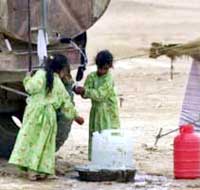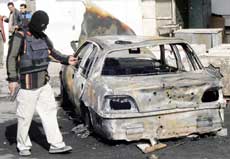Untitled Document
 |
|
The number of Iraqis living below the poverty line increased dramatically after the US-led occupation.
|
Nearly three years after the US-led invasion-turned-occupation of Iraq,
more Iraqis are falling prey to grinding poverty and countless others are terrified
in the insecurity-marred country.
Recent estimates indicated that one fifth of the onetime rich Iraqis are living
below the poverty line since the US invasion of Iraq in March 2003, while indiscriminate
attacks using car bombs and resistance operations against US forces have jumped
by 30% in 2005.
"A study conducted by the ministry in coordination with the International
Monetary Fund and the United Nations Development Program shows that 20 percent
of the population is affected by poverty," Leila Kazem, director general
of the department of social affairs at the labor ministry, told Agence France
Presse (AFP) Wednesday, January 25.
"Some two million Iraqi families live under the poverty line, as defined
by international criteria, which is fixed at one dollar per day per person."
A recent study by Iraq's health ministry in tandem with Norway's Institute
for Applied International Studies and the UN Development Program (UNDP) said
children are paying the silent cost of the US-led occupation with malnutrition
rates exceeding by far those in the world’s poorest and disease-plagued
countries.
The report added that acute malnutrition among Iraqi children has nearly doubled
since the US-invasion-turned-occupation in March 2003.
Planned Aid
Kazem said that the deteriorating living standards were the result of the "rise
in unemployment, violence and the decline in public sector and civil services".
"The number of people requiring social assistance by our minister is dwarfed
by the large number of people in need," she said.
She added that "actually only 171,000 Iraqi families receive social assistance,"
compared to the two million needing it.
The official said that the small amount of aid, which runs between 40,000 to
50,000 dinars (30 to 35 dollars) a month, will be increased by a new amendment
to a social security law dating from 1980.
According to the amendment, aid will be set between 70,000 dinars (50 dollars)
minimum for a family of two and 120,000 dinars (85 dollars) for families with
six or more.
It will also be extended to groups not covered by the former regime of Saddam
Hussein, including the unemployed, the infirm, the elderly and low income groups.
In 2004, the British medical charity, Medact, said that the US-led war on Iraq
has caused a public health disaster that has left the country's medical system
in tatters and increased the risk of disease and death.
It added that cases of vaccine-preventable diseases were rising and relief
and reconstruction work had been mismanaged.
 |
|
Iraqis no longer feel secure in new Iraq.
|
Contracting Battles
The stud coincided with a leaked US report that faulted US reconstruction
promises in post-invasion Iraq.
The report, by the office of the Special Inspector General for Iraq, showed
how ordinary and needy Iraqis paid the price of what it termed "contracting
battles" between the US State Department and the Pentagon over post-war
bonanza, according to the New York Times.
It said that the $25 billion reconstruction efforts were also hobbled by understaffing,
a lack of technical expertise, bureaucratic infighting, secrecy and rising security
costs.
It further expresses concern about writing contracts for an entity with the
"ambiguous legal status" of the Coalition Provisional Authority.
It said "seemingly odd decisions" on responsibility for aspects of
the reconstruction have been recounted repeatedly.
"It almost looks like a spoils system between various agencies,"
Steve Ellis, a vice president and authority on the Army Corps of Engineers at
Taxpayers for Common Sense in Washington, told the Times.
"You had various fiefdoms established in the contracting process,"
said Ellis, who read a copy of the document.
The newspaper said it obtained a copy of the report from a person at a closed
forum at which roughly two dozen experts from outside the Special Inspector
General's office debated the report.
It comes amid rising concern among Americans about President George W. Bush's
policy in Iraq, where billions of dollars have been spent on a reconstruction
effort that critics say has yielded relatively modest results.
Growing Insecurity
Meanwhile, insecurity, caused by the presence of foreign troops and indiscriminate
attacks, has grown in post-invasion Iraq.
Both the random and resistance attacks have increased by 30 percent in 2005,
Reuters reported on Tuesday.
The US military said the Iraqi groups have carried out 34,131 attacks against
US forces compared to 26,496 in 2004, counting the attacks against US and allied
troops, Iraqi government security personnel and Iraqi civilians.
The number of attacks involving improvised explosive devices (IEDs), or roadside
bombs, increased to 10,593 in 2005 from 5607 in 2004, the military added.
Attacks using suicide vests rose to 67 in 2005 from seven in 2004 while suicide
attacks with car bombs rose to 411 in 2005 from 133 in 2004, , the military
added.
"Given the fact that the total number of attacks are up and Iraqi casualties
are rising, it is real hard to say we have seen any light in this tunnel,"
said Daniel Goure, a defense analyst of the Lexington Institute think tank.
Some 2,237 US soldiers were killed in Iraq since the March 2003 invasion, according
to a Pentagon tally. Another 16,472 US troops have been wounded.
The Pentagon said more than half of the US casualties in Iraq stem from the
homemade bombs, often buried along a roadside or hidden inside debris or even
carcasses and usually detonated by remote control or with a timer.
The number of US military deaths last year, 846, was nearly identical to the
previous year, 848, while the number wounded in combat last year - 5939 - fell
from 2004's total of 7989.
Resistance factions have frequently distanced themselves from militants and
suicide bombers who target mosques and innocent civilians.

